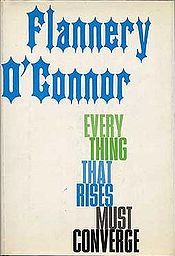 Participants will discuss Welty’s “Why I Live at the P.O.” and O’Connor’s “Everything That Rises Must Converge.” The discussion will be free and open to the public, and copies of the stories are available from the library in advance.
Participants will discuss Welty’s “Why I Live at the P.O.” and O’Connor’s “Everything That Rises Must Converge.” The discussion will be free and open to the public, and copies of the stories are available from the library in advance.Born in Mississippi in 1909, Eudora Welty published her first short story in 1936 in the midst of the Great Depression. “Why I Live at the P.O.” was an early story, published in 1941 in The Atlantic Monthly, and included later that year in her first collection, A Curtain of Green, the book that established Welty’s reputation. She pursued a long and productive career as a writer, during which she received the Pulitzer Prize for Fiction, the National Book Award, the Presidential Medal of Freedom, and the National Medal of the Arts. She died in 2001.
 Flannery O’Connor was born in Georgia in 1925, and published most of her work in the 1950s and 1960s. Known for her Southern Gothic style of writing, O’Connor published two novels but is best remembered for her two story collections, A Good Man is Hard to Find and Everything That Rises Must Converge. She died from complications of lupus in 1964 at the age of thirty-nine; her posthumously published Complete Stories won the National Book Award.
Flannery O’Connor was born in Georgia in 1925, and published most of her work in the 1950s and 1960s. Known for her Southern Gothic style of writing, O’Connor published two novels but is best remembered for her two story collections, A Good Man is Hard to Find and Everything That Rises Must Converge. She died from complications of lupus in 1964 at the age of thirty-nine; her posthumously published Complete Stories won the National Book Award.Book Club for Writers is a fiction discussion program that meets four times a year. Discussions are open to all, and focus particularly on questions of craft and technique that will interest writers and aspiring writers. Created by the New Hampshire Writers’ Project, Book Club for Writers is sponsored locally by a fiction writing group that meets weekly at the Haverhill Corner Library.
The next Book Club for Writers discussion will be held on Thursday, October 24 and will feature stories by three contemporary writers: “Cat ’n’ Mouse” by Steven Millhauser; “Super Goat Man” by Jonathan Lethem; and “In the Black Mill” by Michael Chabon.